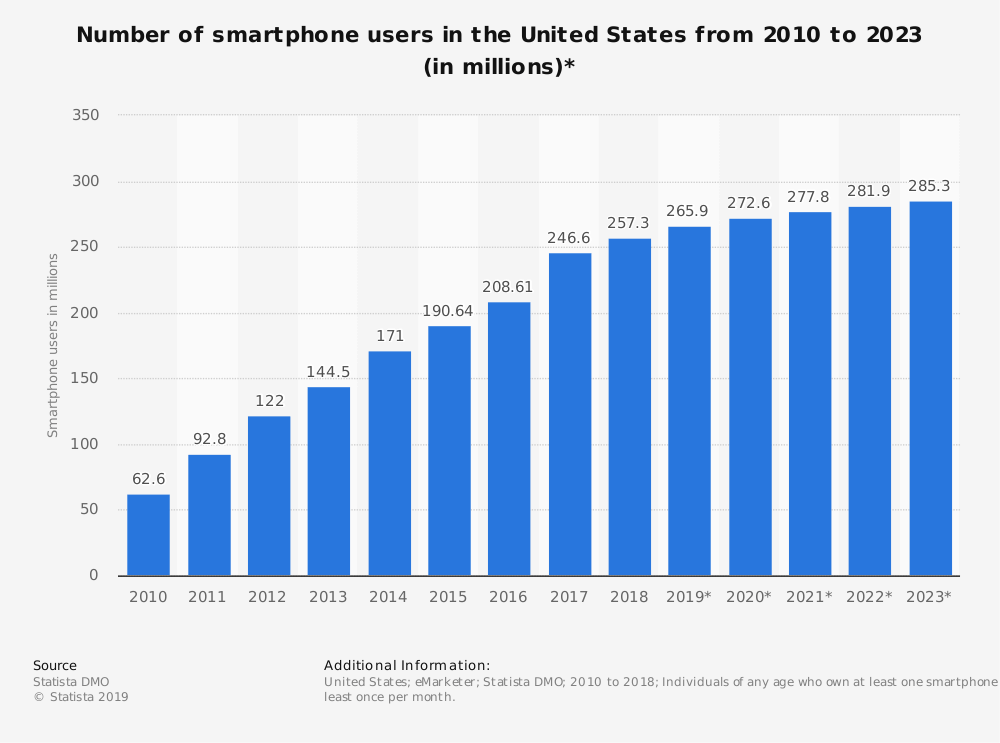The advantages of a VoIP business phone system are quickly evident to those who make the switch, including reduced costs and increased flexibility. But as small businesses prioritize client service while embracing flexible work schedules and on-the-go assignments, many VoIP users still wonder, “can I use VoIP on my cell phone?”
The answer is yes. Businesses can see greater employee efficiency when workers use their mobile devices as VoIP phones.
Why Should Businesses Offer VoIP Cell Phone Options?
BYOD, or bring your own device, is a concept that allows employees to choose and supply their own devices, including cell phones, computers, and tablets. BYOD is rapidly gaining traction in businesses because people love their personal devices — especially their phones. BYOD makes it even easier for employees to turn the phone in their pocket into an office phone by embracing mobile VoIP technology.
Over 257 million Americans were smartphone users in 2018. By 2023, that number is expected to increase to more than 285 million.¹

Using VoIP on Mobile Phones
VoIP phone systems send voice and other communications as data packets via the internet — the acronym officially stands for Voice over Internet Protocol. Many VoIP service providers offer advanced features that can turn the cell phone into a company phone without customers or clients even knowing the difference.
For instance, call routing can set the VoIP phone number to follow an employee to any other office extension or to a home or mobile phone number. At the same time, the worker can make calls from the cell phone with the Caller ID showing the customer the familiar company number and name.
Those with VoIP services in the office can also configure mobile devices to pick up an internal WiFi and automatically register with the office PBX system. An advantage of this method is that the phone will only function as a company phone on-site, helping promote positive work-life balance.
With the flexibility of VoIP services offering employees calling features such as hold music, voicemail and access to conference and video calls, it becomes easy to use a cell phone for work — even on a VoIP system.
Advantages of Using VoIP Mobile Phone Service
The use of personal smartphones at work is becoming standard. Over half of employees say their employers require them to use their personal smartphone at work, and 77 percent of employers say they expect personal smartphone use to increase over the next year.².
For small businesses, employing a BYOD policy and turning personal smartphones in business VoIP cell phones can be both cost-effective and employee-friendly. VoIP mobile phone service providers offer services that help:
Increase Flexibility – business owners and employees can be readily available to customers and colleagues from any location, providing the same professional communication as they would from an office phone.
Lower Employee Costs – smartphone users can benefit from lower cost calling and texting while the business can pay for fewer office phones.
Improve Speed – Digital data transmission using VoIP is typically faster as the data is spread over multiple packets to ensure the fastest route to the intended destination.
Reduce Frustration – Instead of asking employees to learn a new phone system, you can onboard them faster and provide convenient internal and external communication options via the cell phone they’re already used to.
VoIP Cell Phones Can Improve Business Communication
Making a cell phone a mobile VoIP phone using an app or VoIP services can also add new and useful features that can enhance overall business communications including unlimited calling, at lower cost, auto attendant phone systems, and call recording. Learn more about the business VoIP features that could improve your company’s communication.
Editor’s Note: This article was most recently updated in 2019 to include accurate VoIP, smartphone, and business phone system features information. It was first published in 2016.
References
¹ https://www.statista.com/statistics/201182/forecast-of-smartphone-users-in-the-us/
² https://www.cio.com/article/3141304/employees-feel-pressure-to-use-personal-smartphones-at-work.html

